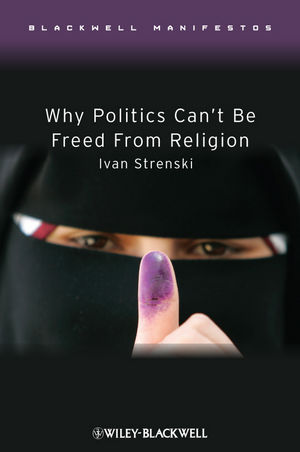Why Politics Can't Be Freed From ReligionISBN: 978-1-4051-7649-1
Hardcover
216 pages
March 2010, Wiley-Blackwell
 Other Available Formats: Paperback
|
||||||
Acknowledgments xi
1 When God Plays Politics: Radical Interrogations of Religion, Power, and Politics 1
2 Interrogating ‘Religion’ 8
1. Religion Trouble 8
2. ‘Seeing’ Religion: Six Common Clichés 11
3. Gagging at the Feast of Two Unexamined Assumptions: Religion, All Good or All Bad 14
4. The Religion-Is-No-Good Cliché 21
5. The Second Set of Two Clichés: Religion Is Belief and Belief in God 24
6. ‘Religion’s’ Private Parts 33
7. Powerless in Paradise 35
8. Two Ways to Eliminate ‘Religion’ 36
9. Is Religion Our Phlogiston? An Historical Test Case 39
10. Talal Asad’s ‘Religion’ Trouble 42
11. The Trick of Defining ‘Religion’ 46
12. Owning ‘Religion’ 50
13. How Durkheim Took ‘Ownership’ of ‘Religion’ 55
14. Religion and Its Despisers 59
3 Interrogating ‘Power’ 62
1. Confronting the Paradox of ‘Power’ 62
2. How ‘Power’ Plays Havoc with Thinking about “Institutional Violence” 66
3. Whom Should We Blame? ‘History’ on Trial 70
4. History’s Helper: We Should Also Blame Foucault 81
5. Problematizing Power in South Africa 84
6. Foucault versus Foucault 88
7. Thinking about Power as Auctoritas and Hierarchy 90
8. What More Is to Be Done? Thinking about Power as Auctoritas and Social Force 97
4 Interrogating ‘Politics’ 100
1. Defining ‘Politics’ 100
2. Where There Is No Politics: Despotism and Totalitarianism 102
3. Autonomous Politics 105
4. Where Our ‘Politics’ Makes No Sense 107
5. Politics, the Construct 109
6. Two Pernicious Views of ‘Politics’ 112
7. History Lessons for Professor Morgenthau 116
8. What Constitutionalism Owes the Council of Constance 119
9. The Emergence of the Political . . . from the Religious 123
10. Machiavelli and Luther: Critical Contributions to the Autonomy of Politics 125
11. Foucault’s Fault II: ‘Everything Is Political’ 130
12. The Hidden Fascism of Thinking that Everything Is Political 133
13. Public and Private: No Absolute Line of Demarcation 135
14. Resisting the Panopticon 136
15. Afterword: The Autonomy of ‘Politics’ and the Nation-State 140
5 Testing Interrogations of ‘Religion,’ ‘Power,’ and ‘Politics’: Human Bombers and the Authority of Sacrifice in the Middle East 142
1. Is ‘Suicide’ Bombing Religious? 142
2. Making Too Much of Religion in ‘Suicide’ Bombing: ‘Islamofascism’ 144
3. Dying to Make Too Little of Religion in ‘Suicide’ Bombing: Robert A. Pape 147
4. No Religion in ‘Suicide’ Bombing: Talal Asad 150
5. How Religion Helps Explain Human Bombing 153
6. Human Bombing Is “Catastrophe,” but also a “Triumph” of “Secular Immortality” 155
7. Human Bombing = Jihad + Sacrifice 160
8. Sacrifice or Suicide? 164
9. But Do Any Muslims Really Think Human Bombers Are ‘Sacrifices’? 168
10. Sacrifice Makes Authority 175
11. How and Why Sacrifice Works: The Authority of Sacralization 176
12. How and Why Sacrifice Works: No Free Gifts 180
13. Concluding Remarks 182
References 187
Index 196



